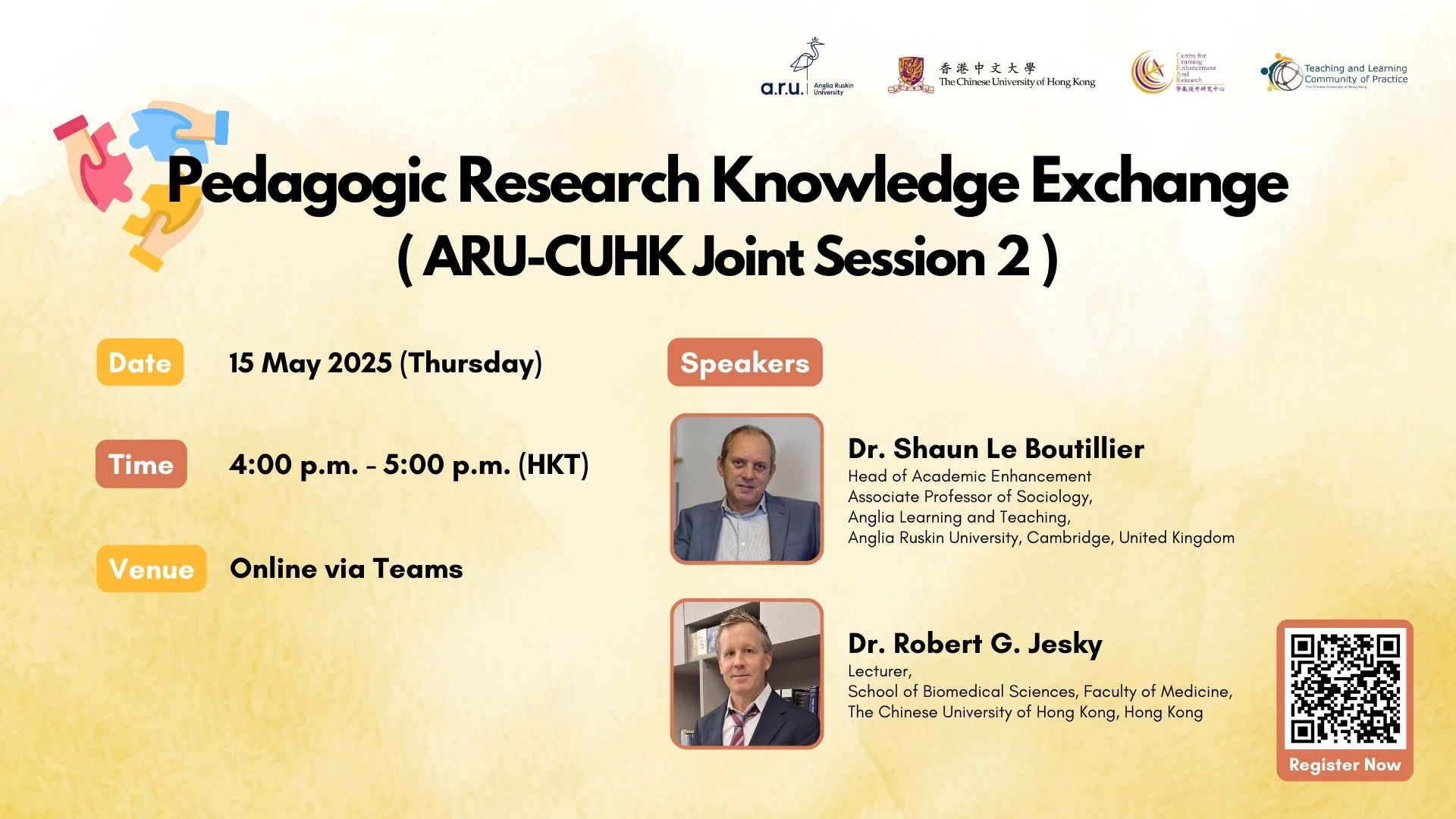Pedagogic Research Knowledge Exchange (ARU-CUHK Joint Session 2)
| You are cordially invited to join the “Pedagogic Research Knowledge Exchange – ARU-CUHK Joint Session 2”, organized by the Teaching and Learning Community of Practice (T&L CoP). In this session, educators from The Chinese University of Hong Kong and Anglia Ruskin University will collaborate to share their teaching innovations and insights on curriculum design, pedagogy and assessment. |
|
| Speakers and Topics: | 1. ARU’s Assessment and Feedback Strategy: Key Stages and Insights Dr. Shaun Le Boutillier, Head of Academic Enhancement, Associate Professor of Sociology, Anglia Learning and Teaching, Anglia Ruskin University, Cambridge, United Kingdom Abstract: This presentation shares key findings from ARU’s development of a new assessment and feedback strategy, structured around three stages: the Review of current practices, the Analysis of Desired Outcomes, and Implementation planning. The Review identified effective models and areas for improvement, informing analytical claims within the Analysis of Desired Outcomes for sustainable feedback, active learning, and inclusive assessment. The presentation will discuss the insights and challenges emerging from each stage, including critical considerations for Implementation. 2. Transforming Medical and Biomedical Education: Neuroscience-Backed Strategies for Optimal Student Outcomes Dr. Robert G. Jesky, Lecturer, School of Biomedical Sciences, Faculty of Medicine, The Chinese University of Hong Kong, Hong Kong Abstract: Incorporating neuroscience-backed strategies into biomedical education can significantly optimize student engagement and long-term retention of complex material. This presentation will explore how multisensory teaching techniques, scaffolded instruction, spaced repetition, and adaptive learning platforms deepen student understanding and prepare them for real-world applications in the medical and life sciences. Research shows that multisensory approaches enhance memory encoding by engaging multiple cognitive pathways. Scaffolded instruction, rooted in Cognitive Load Theory, further supports this by structuring learning tasks in progressive complexity, reducing cognitive overload and improving comprehension. Likewise, adaptive learning platforms, provide a novel approach to adjusting content delivery to match individual needs. By continuously challenging students at their precise level of understanding, these platforms enhance engagement and strengthen neural pathways for better long-term knowledge retention. This presentation synthesizes current research to illustrate the practical application of these neuroscience-informed methods in higher education. By the end of the session, attendees will gain key insights into the implementation of these techniques to enhance student engagement and retention in medical and biomedical programs. |
| Date: | 15 May 2025 (Thursday) |
| Time: | 4:00 pm – 5:00 pm (HKT) |
| Format: | Online via Teams |
| Target Audience: | Academic staff and professional staff |
| Registration: | https://cuhk.qualtrics.com/jfe/form/SV_eXxEAaKOiUdMV7g (Registration deadline: 14 May 2025 (Wed) 23:59 HKT) For enquiries, please contact Ms Vienne Lin (viennelin@cuhk.edu.hk) or Ms Vanessa Kiu (vanessakiu@cuhk.edu.hk). |
